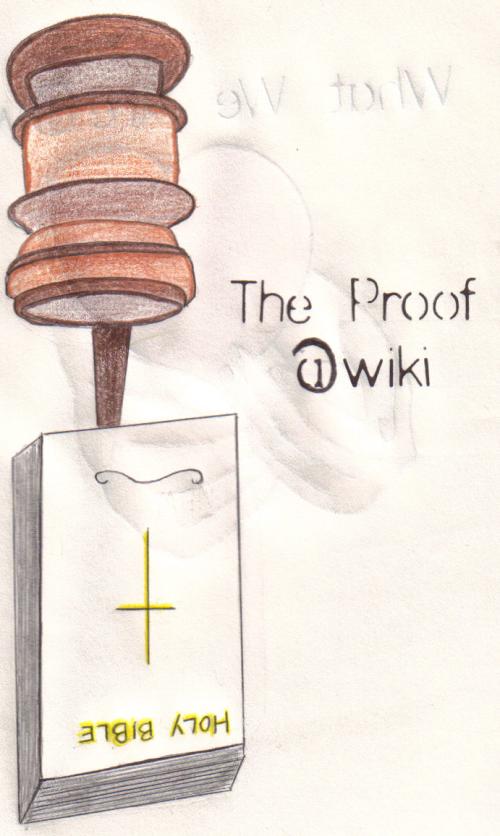| Entrance | Mainstreet | Wiki | Register |
|
# of watchers: 14
|
Fans: 0
| D20: 1 |
| Wiki-page rating |  Stumble! Stumble! |
| Informative: | 0 |
| Artistic: | 0 |
| Funny-rating: | 0 |
| Friendly: | 0 |


2006-11-09 [Lothuriel]: ^__^ I am glad you think so. Sometimes, I just don't make sense.
2006-11-09 [Sedition]: ive been watching the wiki for awhile(i used to post,but sometimes our conflicts just got way to hot for either of us to take in a peacefull manner,so i resigned from discussion),and to awnser your question about why atheist or other freethinkers ask why "god does this or that" is,to a point,retorica
2006-11-10 [Lothuriel]: Then, if what you say is true, then an atheist or agnostic would only ask the question to provoke a believer. That is what you call strategy? Don't bother. I think it is evident that a Christian or a true believer in God has their mind made up. I can promise you that your "questions" about why God did or didn't do something has already been answered for us, in the Bible or through prayer. Quite frankly, atheism disturbs me. Everytime I talk to one, especially one that asks such questions, I leave the conversation with my Faith stronger and my heart heavier.
2006-11-10 [Sedition]: well,faith or lack of is different for everyone,i wouldnt be so presumptious to make the common mistake of "no true scottsman" when talking about "true believers".eve
2006-11-10 [Lothuriel]: The sickness in this world that you refer to are those who do things in God's name that have no right to do so. I respect the laws of this land and yes, most of them are based on "religious" beliefs but, for the most part they are good laws. I have a problem with many laws that force me to "tolerate" things I dont' believe in but, I am also commanded by God to obey the laws of the land and I do. I try not to push my way of thinking on to others. I do like to talk about religion, or in your case the lack there of. But, when I talk to others about religion and such, I do my best to try to do so in non-converting way. Does that make sense?
And I see your point. I tend to assume that every Christian or true believer is as strong in the Faith and beliefs of Christ as I am.
2006-11-10 [Sedition]: when it comes to religion,sadly
Peace is fickle and impossible,but you still have to try anyway,might get lucky.
2006-11-10 [Lothuriel]: I suppose you are a teeny bit right there. Although I like to simply present the facts of my own beliefs to others and leave it at that, there is always that seed of hope that they will join me. But, I do my best not to intentionally tell someone "This is my way and you shall believe it or else." I do, as I said before, find the concept of atheism and agnostics quite disturbing but I am not going to chase them down and force feed them the word of God. I would hate to see anyone choke *wink*.
"Peace is fickle and impossible,but you still have to try anyway,might get lucky"
That reminds me of something my father used to say. My father was a Marine you see and his division's motto was "Pray for Peace and dream to love. Train for War and live to fight"
2006-11-10 [Sedition]: ah,i enlisted in the marines two months ago,saw that quote on a peice of paper awhile back.anyway,no matter how hard you try,atheist or christian,deba
2006-11-10 [Lothuriel]: I wasn't aware that we were debating anything. I thought we were having a nice, civil discussion of the differences in our views.
2006-11-10 [Sedition]: i wasnt implying that we were debating,i was speaking in general terms.
2006-11-10 [Lothuriel]: Ah, ok then. ^__^
2006-11-12 [Child of God]: I don't have time to keep up on my wiki, here's a good site that may interest the members until the semester is done. www.doesgodexi
2006-11-12 [Cia_mar]: cool web site thanks for the link i will read it more later!!!
2006-11-12 [Sedition]: i as well will read into it.
2007-01-09 [Expensive Fidelity]: I'm just wanting to say, in a small voice, that science can, and very very often does, lead to physical proof. After all, you can watch a chemical reaction occur, which means it is, in fact, hard evidence. Metaphysics are something that is usually pretty hard to create substantial and physical proof of.
2007-04-09 [Moonlit Serenade]: As a question, how can theories about history (as written documents could very well be like a storybook is today) act as proof, but science, a very real and proven thing, can't? It seems a bit absurd, like saying, another person's supposed thoughts are more real than that person's actions.
2007-04-09 [Child of God]: This wiki is here to examine historical evidence available that, by accepted standards in the discipline, constitute as historical proof. If someone wishes to debate the legitamicy of history as a discipline, that is outside of the scope of this wiki. Science itself has it's roots in the study and practice of history (the Egyptians, Babylonians and Chinese all developed science after studying history and becoming unhappy with the theories of the past. It then progressed to become a means of discovery). Scientific/emp
I would question those who demand empirical/scie
What then, do empiricists demand for scientific/emp
Do we then demand his cross with the inscription? The cross would have been either reused or burned, depending on how much prior use it had. The nails? Reused or melted down to make something else. The shroud? Would have deteriorated after two thousand years since it wasn't perserved.
So I ask again, what empirical evidence could be given? This is why I look at the historical evidence. It is possible to attain historical information, then draw conclusions from that information. Yes, there will always be room for error. This is, after all, a human discipline and practice, just like science. And just like science, there will be errors and theories that are later proven to be wrong. Humian skepticism cannot be just applied to one discipline and not another. If you are suspicious of history, you must also be suspicious of math and science, since all endeavors eventually lead back to human endeavors. And since it is human to error, all endeavors contain error. So, you either doubt everything that humans do, or you have to accept some givens in order for disciplines such as math and science to be valid. The same is true for history. Some givens, such as the criteria for historical evidence, must be accepted. That is the nature of the world we live in.
2007-04-10 [Mekashef]: This wiki is better presented & contains more information than most others on the same topic. Apart from the ubiquitous typographical errors, this is really grade-A college material. Kudos!
If I may denounce a certain misconception, however: the Gospel pericopes which depict the Pharisees as a fundamentalist sect do not match solid historical data. The Pharisees are attested in a number of reliable sources as an anti-establish
2007-04-10 [Mekashef]: & now if I may object to myself, in the Thomistic fashion:
"But wasn't Paul a Pharisee? Didn't he have St. Stephen executed?"
To which I might answer: "Yes, Paul says himself that he was a Pharisee, but note that he doesn't admit to having witnessed Stephen's death anywhere in the Epistles. You'd think that this kind of information, if it was as crucial as later exegetes claim, would have crept in there somehow."
Paul admits to having "persecuted the Church of God" in 1 Corinthians, & again in Philippians, but that is the extent of his confession of guilt in the undisputed Epistles; he is not specific as to the exact nature of his persecution. This isn't enough information to conclude that violence to Christians was a Pharisaic requirement. Philippians even seems to dissociate the two: "as to the law, a Pharisee; as to zeal, a persecutor of the church" (3:5-6).
2007-04-10 [Child of God]: Thank you very much for the compliment.
I agree with you for the most part on the Pharisees. I think it says somewhere that Paul authorized Stephen's death, but implies that he actually wasn't there. But Jewish records of the time does suggest that the Pharisees were a very strict, legalistic group. Medieval Jewish sources that refer back to the time "before the fall of the second temple during the Roman occupation" speak of the legalism of the Pharisees, which is what was generally attacked in the Bible. (ie. Philo) The accusations towards the Pharisees were on spiritual-mora
Maybe someone else here with a denominational background might be able to add some input?
2007-04-11 [Mekashef]: Philo was Therapeutae (or something close to it). I would not be surprised if he criticized the Pharisees, but I'm not altogether certain he was qualified to do so. He's not quite medieval either (unless that's not what you're implying? I'm confused).
What I am saying is that the NT's depiction of the Pharisees is anachronistic & unfair. From my experience I would say this view is well accepted in contemporary scholarship. I don't know much about the views of different denominations, but I think the more progressive groups like the United Church also accept this notion.
To some, this may seem like a strictly academic point -- but it really isn't. All of contemporary Judaism, to the exception of the Karaim, is more or less directly descended from Pharisaism. Simply accepting the NT's criticism at face value isn't very nice to contemporary Jews.
Number of comments: 355
| Show these comments on your site |
|
Elftown - Wiki, forums, community and friendship.
|